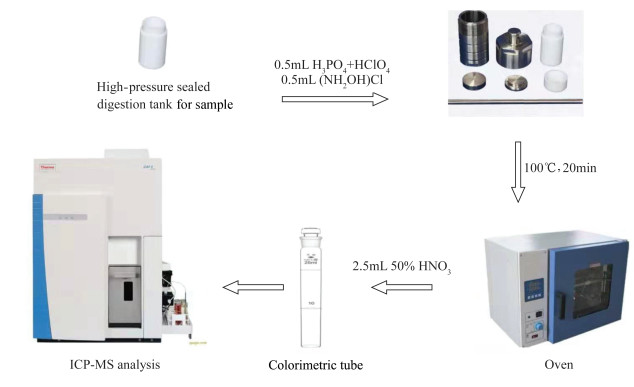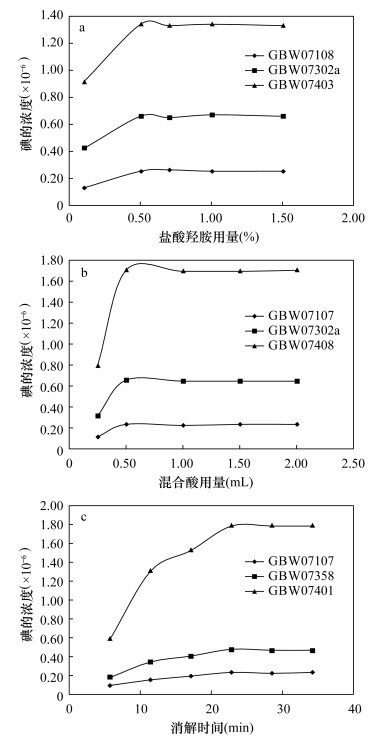Determination of Trace Iodine in Soils, Sediments and Rocks by ICP-MS after Pressurized Acid Digestion-Hydroxylamine Hydrochloride Reduction
-
摘要: 碘是活跃元素,价态多,各价态间易相互转化,化学性质不稳定,使用ICP-MS测定土壤、沉积物和岩石样品中的痕量碘,样品前处理和测定结果的稳定性是主要问题。本文采用磷酸-高氯酸高压密闭消解处理样品,提高了样品分解效率,也避免了碘的挥发损失,通过加入0.5mL 20g/L盐酸羟胺溶液将碘还原为I-,提高了碘的稳定性,再于100℃烘箱中保温至少20min,以稀氨水作介质,降低了ICP-MS测定过程中的记忆效应。方法相对标准偏差(RSD)为4.88%~9.19%,相对误差为-6.90%~8.33%,回收率为92.5%~109.6%,检出限(3s)为0.012μg/g。本方法的测定数据与半熔法一致,解决了当前方法存在的分析流程长、空白高、岩石样品提取不完全、提取装置繁多等问题,可以作为土壤、沉积物、岩石中痕量碘测定方法的一种补充,适合批量样品分析。要点
(1) 高压密闭消解处理样品提高了分解效率,且碘不易挥发损失。
(2) 确定了样品分解条件。
(3) 本法可作为碘测定方法的一种补充。
HIGHLIGHTS(1) The application of high-pressure sealed digestion technology to sample treatment improved the decomposition efficiency, and iodine was not easy to volatilize.
(2) The decomposition conditions of the sample were determined.
(3) This method could be used as a supplementary method for the determination of iodine.
Abstract:BACKGROUNDIodine is an active element with many valences. It is easy to transform each other between valence states and its chemical properties are unstable. In terms of determination of trace iodine in soil, sediment and rock samples by inductively coupled plasma-mass spectrometry (ICP-MS), sample pretreatment and result stability are the main problems.OBJECTIVESTo obtain stable results, low blank, a short analysis period and complete extraction.METHODSThe sample was digested by phosphoric acid-perchloric acid under high-pressure sealed conditions. The decomposition efficiency of the sample was improved and the volatilization loss of iodine was avoided. The stability of iodine was improved by adding 0.5mL 20g/L hydroxylamine hydrochloride solution to reduce iodine to I-. The iodine was kept in an oven at 10℃ for at least 20 minutes, and the memory effect during ICP-MS analysis was reduced by using dilute ammonia water as the medium.RESULTSThe relative standard deviations of the method were 4.88%-9.19%, the relative errors were -6.90%-8.33%, the recoveries were 92.5%-109.6% and the detection limit (3s) was 0.012μg/g.CONCLUSIONSThe data obtained by this method are in good agreement with those obtained by the semi-melting method. It solves the problems of long analysis process, high blank, incomplete extraction of rock samples and various extraction devices. It can be used as a supplement to the determination of trace iodine in soil, sediment and rock, and is suitable for batch sample analysis.
-
得益于海相页岩层系油气资源的钻完井和压裂技术革新,美国成为世界上最早实现页岩气商业化开采的国家, 其页岩气资源主要来自海相或海陆过渡相地层[1]。美国页岩气的成功商业化为中国页岩油气勘探开发关键技术探索提供了一定经验和借鉴[2]。我国广泛发育有海相、陆相和海陆过渡相三类富有机质页岩[3],页岩气可采资源量排名世界第二,其中陆相页岩气可采资源潜力为7.9×1012m3[4]。然而,与海相富有机质页岩相较,陆相页岩在沉积环境、干酪根类型、有机质成熟度和矿物组分等方面存在较大差异[5-7]。当前,我国海相页岩气储量评估方法与压裂技术基本达成共识,然而关于陆相页岩气(油)的研究在广度与深度上远远不足。鄂尔多斯盆地作为我国中新生代大型内陆坳陷沉积盆地,发育有石炭系、二叠系和三叠系等系列页岩沉积。其中三叠系延长组7段(C7)烃源岩埋藏浅,有机质丰度高,热演化程度低,具有良好的页岩气(油)成藏条件[8-9],有必要对其展开深入研究。
页岩孔隙结构是决定储层储集与运移能力的关键,对构建页岩气渗流模型[10]、完善压裂技术[11]具有重要意义。Loucks等[12]研究表明页岩中孔隙类型丰富,包括粒间孔、粒内孔、微裂缝和有机孔等,不同类型孔隙结构成因不同,对页岩气储集能力的贡献亦不相同。Wang等[13]证实页岩矿物基质与有机质分布模式在一定程度上控制和反映页岩的孔隙结构特征。王跃鹏等[14]提出延长组页岩中普遍发育的纹理结构会形成平行层理的孔缝结构,严重时造成井壁坍塌。前人工作表明,研究页岩孔隙结构有必要同时考虑有机质与矿物基质的空间分布特征。研究者围绕鄂尔多斯C7页岩孔隙结构已开展了大量研究工作,但是受测试方法的限制,对其微观结构的认识仍较为薄弱。吴银辉等[15]、杨维磊等[16]、庞铭等[7]、Jiang等[17]通过气体吸附实验、高压压汞实验和核磁共振实验对C7页岩孔隙结构特征展开研究,结果表明C7页岩中3~30nm的孔隙对总孔隙度贡献最大,为构建页岩孔隙模型提供了重要数据参考,但是上述成果对闭孔表征不足且缺乏对孔隙空间结构特征的直观认识。徐红卫等[18]采用扫描电镜对C7页岩孔隙结构特征展开研究,其研究成果表明C7页岩中主要发育纳米级狭缝型黏土矿物层间孔,然而其采用机械抛光制样对页岩表面孔隙结构造成了一定破坏,同时缺乏对页岩不同组分三维空间分布特征的认识。
目前,油气领域多采用氩离子抛光-扫描电镜方法对页岩孔隙结构进行直观观测[13, 19-20]。该方法有助于快速认识页岩孔隙类型、分布模式及孔径范围等,然而不足以提供精确数据用以构建页岩气三维渗流模型。对页岩三维结构的认识主要是利用微米X射线显微镜(micro X-ray microscope)[13, 21]、纳米X射线显微镜(nano-transmission X-ray microscope, TXM)[21-24]与聚焦离子束-扫描电子显微镜(focused ion beam-scanning electron microscope, FIB-SEM)[25-27]。与TXM和FIB-SEM方法相较,微米X射线显微镜方法的扫描范围大且成本较低,是研究陆相页岩纹理结构特征的重要技术手段。基于此,本文选取鄂尔多斯盆地南缘代表性C7页岩,采用氩离子抛光-扫描电镜与同步辐射微米X射线显微镜方法,对C7页岩的孔隙结构特征进行详细表征,探究陆相页岩孔隙结构特征影响因素,以期为完善陆相页岩气产能评估与压裂技术提供参考。
1. 实验部分
1.1 实验样品
C7页岩实验样品采自鄂尔多斯盆地遥科一(YK1)井。YK1井位于陕西省铜川市,构造位置属于鄂尔多斯盆地南缘渭北隆起构造单元(图 1)。长7油层组位于延长组中下部,代表湖盆最大扩张期。该时期随着盆地强烈沉陷,湖盆从长8期开始至长7期达到鼎盛时期,环绕湖盆退积型三角洲广泛发育并在开阔的浅湖-深湖区形成延长组的最主要的生油岩系[16]。岩心观测发现,C7页岩以黑色油页岩、凝灰岩与含油砂岩为主,夹杂碳酸盐岩薄层,如图 2所示。
X射线粉晶衍射测试表明,C7页岩样品中的石英与长石平均含量较高(分别为32%和24%),碳酸盐岩和黄铁矿含量相对较低,分别为9%和3%。脆性矿物平均含量大于50%,有利于天然裂隙和人工诱导裂缝的发育。黏土矿物含量为33%,几乎全部由伊蒙混层组成。伊蒙混层中伊利石含量为80%,主要为有序混层矿物(R=1型),表明延长组7段页岩处于成岩阶段中期[28]。实验样品有机碳平均含量为4.79%,属于富有机质页岩,其平均镜质体反射率为0.72%,对应有机质未成熟或低成熟阶段。
1.2 样品测试和数据分析方法
1.2.1 扫描电镜测试
选取新鲜页岩样品薄片(~1cm2),对其进行初步机械抛光后(2400目),放入离子减薄仪(LJB-1A,沈阳华业公司),利用氩离子束轰击预抛光的表面,得到品质较高的平面进行扫描电镜观察。制样过程中,氩离子减薄仪的工作电压为5kV,电流为100μA,抛光时间为10~12h[19, 25]。扫描电镜观测利用Merlin Compact LE0 1530 VP电镜(卡尔·蔡司公司)完成,矿物元素组成定性定量分析使用AZtec X-Max能谱仪(牛津仪器)进行。实验时扫描电镜加速电压为5kV,工作距离为4~6mm;能谱仪的工作电压为15kV,工作距离为8~10mm。
1.2.2 同步辐射X射线显微镜测试
利用砂纸将C7页岩样品打磨成圆柱形,直径大约5mm。微米X射线显微镜扫描实验在上海同步辐射装置X射线成像及生物医学应用光束线(BL13W1)[29]开展。X射线在磁场强度1.9T、磁周期14cm的十六极摆动器中激发,通过Si(111)双晶单色器进行单色化后穿过样品,然后被带有闪烁体的电荷耦合元件系统接收[11]。本文实验像素尺寸为3.25μm,能量为25keV, 样品到探头的距离为10cm。扫描过程中将样品的一端固定在旋转样品台上。整个实验中样品台共旋转180°,每隔0.2°采集一张投影图像。通过样品台的旋转,采集不同视角的投影图像,利用PITRE (phase-sensitive X-ray image processing and tomography recons-truction)软件进行图像重构[30]。首先,利用5张暗场图像与20张明场图像进行背景强度校正;其次,将采集的投影图像转换成正弦图像并进行归一化处理;最后,利用滤波反投影方法对正弦化图像进行重构[31]。
1.2.3 数据分析方法
微米X射线显微镜重构数据利用Avizo软件进行分析。首先,选择页岩代表性体积块1625μm × 1625μm × 1625μm,利用非局部均值滤波算法对所选CT图像进行平滑。其次,依据孔隙、有机质、碳酸盐岩和硅酸盐岩等对X射线的吸收系数差异, 采用阈值分割方法进行图像分割,实现延长7段页岩三维结构的重建与可视化。
2. 结果与讨论
2.1 孔隙二维结构特征
本文在参考Loucks等[12]页岩孔隙分类方案基础上,依据孔隙成因与其赋存特征将C7页岩气储集空间划分为无机孔、有机孔和微裂缝三类,如表 1所示。
表 1 遥科1井延长7段页岩孔隙类型及其特征Table 1. Pore types and characteristics of C7 Member shale from Yaoke-1 Well孔隙类型 孔隙示意图 孔隙形态 孔径范围 分布特征 无机孔 粒间孔 
三角形或狭缝形 30nm~1μm 发育在脆性矿物周缘及粉砂级黏土矿物碎屑之间,普遍发育,连通性较好 黏土矿物层间孔 
平直狭缝状 长1~3μm,孔宽数十纳米 分布于黏土矿物层间,不甚发育 溶蚀孔 
凹坑状 50~300nm 多见于石英、长石等矿物内部,彼此孤立 晶内孔、生物孔、晶间孔等 
圆形、椭圆形或方形等 百纳米~数十微米 与矿物相关,如生物遗体被黄铁矿充填,彼此孤立; 或形成于矿物晶间 有机质与有机孔 致密有机质 
连续且不规则状 N/A 有机质最主要的赋存方式,即粒间孔被有机质完全充填,且有机质内部无孔隙发育 
集合体形式 N/A 与黄铁矿呈现出包裹关系,与微晶之间残余少许孔缝 
有机质分散状,发育锯齿状孔隙 数百纳米至数微米 致密有机质与基质矿物接触面之间发育孔隙,较为普遍 有机孔 
狭缝状、三角状 50~300nm 受控于黏土矿物层间孔结构,有机孔最主要的存在形式 
凹坑状或椭圆状 30~200nm 受生烃作用控制,发育较少 微裂缝 
狭缝状 长数微米,宽几百纳米 发育于脆性矿物的边缘或机械不稳定部位,较平直,延伸长 注:N/A表示not applicable(不适用)。 2.1.1 无机孔和微裂缝结构特征
C7页岩中无机孔广泛发育,包括粒间孔、黏土矿物层间孔和溶蚀孔等。粒间孔主要发育在脆性矿物周缘和黏土碎屑之间。脆性矿物周缘孔以狭缝形为主,孔长约1μm,孔宽约100nm (图 3a),在C7页岩中普遍发育;粉砂级黏土岩屑彼此连接,形成原生粒间孔,是C7页岩中发育最多的孔隙类型,以三角形为主,孔径集中于30~250nm,连通性较好(图 3b)。黏土矿物层间孔发育在黏土矿物层间,以平直狭缝状为主,孔长1~3μm,孔宽数十纳米(图 3c),发育较少。溶蚀孔是烃源岩生烃过程中产生大量有机酸将矿物溶解所形成的次生孔隙。C7页岩中溶蚀孔数量较少且孤立存在,以凹坑状为主,孔径50~300nm(图 3d)。
C7页岩中同时发育黄铁矿晶内孔和锐钛矿晶间孔等特殊的孔隙类型。黄铁矿晶内孔见图 3e。能谱图(图 3f)表明图 3e中十字标记区域元素组成主要为Fe、S、O、Si。该类孔隙基本呈圆形,黄铁矿质孔隙壁厚3~5μm,孔径数十微米,孔隙部分或全部被矿物碎屑或有机质充填,彼此之间并无连通性。锐钛矿晶间孔如图 3h和图 3i所示,孔径集中于数百纳米,连通性较好。此前在海相沉积威远九老洞组页岩[19]、辽河凹陷沙河街组页岩[32]中均观测到该类型孔隙,表明锐钛矿晶间孔的主要形成机理并非受控于沉积环境。C7页岩中亦发育少许生物孔,如图 3g所示,孔径30~50nm,推测为生物遗体被矿物质充填所形成。
微裂缝在C7页岩中较为发育,以构造裂缝为主。构造裂缝一般沿机械不稳定面发育,如脆性矿物与片状黏土矿物的外部或颗粒之间(图 3j,3k),或沿黏土矿物层理发育(图 3l),较平直,延伸尺度较大,长数微米,宽度几百纳米。普遍发育的微裂缝是沟通各类微观孔隙的桥梁,为页岩气运移提供了重要的渗流通道。
2.1.2 有机质与有机孔发育特征
C7页岩中有机孔发育较少,依据发育形态和成因可分成两类。第一类有机孔发育在离散状有机质内部,其形成受控于有机质生烃作用,发育极少,呈椭圆状或凹坑状(图 4a)等,孔径30~200nm。另外一类有机孔与有机黏土矿物共生,是C7页岩中有机孔最主要的存在形式。该类有机孔具有继承性结构,受黏土矿物层间孔的形貌控制,以狭缝状或层状为主,如图 4b和4c所示。黏土矿物强烈的吸附能力促使有机质在烃源岩中富集,与黏土矿物以结合态存在。在有机质生烃过程中,黏土矿物降低了生烃反应活化能,同时为其提供了电子(OH-)和质子(H+)来源。类似结构在四川盆地页岩气勘探有利储层龙马溪组海相页岩中发现较多[6],不仅佐证了黏土矿物的催化生烃作用,而且说明陆相页岩有机孔的形成机理与海相页岩具有一定相似性。
C7页岩中存在大量致密有机质,大小数百纳米至数微米,形态复杂,主要受控于无机孔缝的形状。图 4d中有机质彼此连接,填充于不规则状矿物碎屑粒间孔中,与粒间孔边缘完全接触;图 4e中条带状有机质充填于粒间孔中,彼此孤立存在,单个有机质长达数十微米;图 4f中条带状有机质则充填于黏土矿物层间,取向与黏土矿物一致,宽50~200nm。部分有机质与黄铁矿共生,表现为包裹关系,如图 4g所示,黄铁矿晶间孔几乎完全被有机质充填,仅在有机质与微晶之间残余少许孔缝。致密有机质与矿物基质接触面之间发育部分孔隙,该类孔隙往往与有机质取向一致,呈锯齿状、平直状和三角状等,孔径集中于数微米,如图 4h和图 4i所示。
2.2 页岩三维结构特征
C7页岩微米X射线重构图像如图 5a所示。图像中灰度值由白(255)到黑(0)代表物质的密度由大到小。结合扫描电镜数据判断,白色部分主要为黄铁矿,灰白色部分主要是钙质或铝铁质矿物;黑色部分代表低密度物质,理论上包括微孔隙、微裂缝和有机质。以下将低密度物质界定为有机质,主要原因如下:扫描电镜观测证实C7页岩中主要发育纳米孔,本文微米X射线扫描实验(分辨率3.25μm)不足以识别;从重构图像中可以看出,低密度物质大小集中于亚微米至微米,主要呈带状或星点状等,与扫描电镜下有机质的形貌大小一致;剖面线(图 5b)经过低密度物质时,灰度值均在90左右(孔隙灰度值接近0)。
经过物相分割,通过三维数值模拟得到C7页岩三维结构,如图 6所示。有机质、钙质(包括铝铁质)矿物和黄铁矿分别以红色,绿色以及黄色标记,空白区域代表硅铝质矿物(石英和长石等)。图 6表明C7页岩中,有机质与钙质、铝铁质矿物排列有序,在微米尺度上具有明显的纹层结构,黄铁矿则以无序状分散在矿物基质中。
图 6b展示了C7页岩有机质三维空间分布特征。有机质体积含量为3.4%,整体呈纹层结构。大部分有机质体积较小,均匀地分散于矿物基质中;少数有机质体积较大,取向与纹层一致,如图 7a所示。图 7a是图 6b中部分有机质的放大图,从图中能够看出该有机质颗粒长约700μm,宽约80μm,呈不完全连续分布。钙质和铝铁质矿物的三维空间结构如图 6c所示,其体积百分数达7.5%,同样具有纹层结构,取向与有机质分布模式一致。与有机质的均匀分布不同,钙质与铝铁质矿物在某些纹层内出现富集。此外,少量铝铁质矿物呈球状,体积较大, 如图 7b所示,随机分布于矿物基质中。黄铁矿体积含量较低,约0.7%,在三维空间中随机分布,如图 6d所示。黄铁矿颗粒大小集中于10~20μm,相对均匀地分散于矿物基质中;少数黄铁矿聚集在一起,形成团块儿状集合体。部分黄铁矿可能充填于生物遗体中,其三维结构放大图如图 7c所示。从图中可以看出,该类孔呈不封闭的球状,孔径约45μm。
2.3 孔隙结构特征与其控制因素
扫描电镜观测结果表明C7页岩中无机孔和微裂缝最为发育。无机孔以发育在黏土碎屑颗粒之间的原生粒间孔为主,黏土矿物层间孔和脆性矿物周缘孔等海相页岩中普遍发育的孔隙类型发现较少。一方面,页岩中大量存在的碎屑状黏土矿物为孔隙发育提供了物质基础,是控制主要孔隙类型发育的重要因素之一;另一方面受成岩作用控制,原生层间孔和脆性矿物周缘孔难以保存[33]。与四川盆地广泛发育的海相页岩相较,C7页岩中有机孔鲜有发育[5-7]。有机孔的形成、形貌及大小主要与有机质含量、类型和热成熟度密切相关。鄂尔多斯盆地三叠系C7页岩热演化程度较低,大部分处于低成熟阶段,因此不具备大量发育有机孔的条件。有机质主要呈致密态,不均匀地充填于无机孔与微裂缝中,在一定程度上进一步降低了孔隙度。
扫描电镜测试表明C7页岩中介孔数量占绝对优势,对孔隙体积贡献最大,提供了主要的储集空间。黏土矿物颗粒细小,分选好,是介孔大量发育的关键因素。鄂尔多斯盆地长7期深湖细粒沉积背景导致原始的粒间孔隙相对较小[34-35];强烈的压实作用使颗粒间紧密接触,同时胶结作用使大的粒间孔隙消失,残留了小尺度的粒间孔隙[36]。C7页岩中亦发育少量宏孔,孔径主体数百纳米,主要以粒间孔和微裂缝形态存在。脆性矿物含量较高是宏孔发育的重要原因。但是细粒黏土矿物与有机质的充填作用,在一定程度上导致宏孔数量降低。
2.4 对页岩气运移和压裂的启示
本文利用微米X射线显微镜证实C7页岩在微米尺度上具有明显的纹层结构,有机质纹层发育且连续性强,表明C7页岩具有较强塑性。李丽慧等[37]通过三轴压裂实验证实该类结构中,压裂缝以沿纹层扩展为主且易再次闭合,从而降低了储层的可压裂性。不过,随着有机质成熟度的增加,该结构沿层理方向易于形成相互连接的孔隙网络,从而有利于页岩气的横向运移[38]。扫描电镜测试表明各纹层中的微米级微构造裂缝发育较多,王跃鹏等[14]认为该类裂缝可能是由于水进入页岩内部发生水化作用,导致黏土矿物沉淀而形成的。该结构意味着水力压裂开采技术容易破坏C7页岩结构的完整性,引发井壁坍塌等严重问题。
3. 结论
本文利用氩离子抛光-扫描电镜和微米X射线显微镜方法,对鄂尔多斯陆相延长7段页岩孔隙结构特征进行研究。测试结果表明:①受黏土碎屑和成岩作用控制,延长7段页岩中主要发育纳米级粒间孔与微米级微裂缝,是页岩气的主要储运空间。有机质主要呈致密状,有机孔发育较少,一般与有机黏土矿物共存。②延长7段页岩在微米尺度上具有明显的纹层结构,有机质纹层发育且连续性强,不利于储层压裂。同时,大量存在的黏土矿物与微裂缝在水力压裂时容易引发井壁坍塌等严重问题。
微米X射线显微镜技术是深入研究陆相页岩纹层三维结构特征的有效方法,与氩离子抛光-扫描电镜技术结合,有利于实现页岩孔隙结构特征的多尺度多维度综合表征。本文研究成果可为后期页岩气水平井结构设计、提高井壁稳定性提供改进思路。
-
表 1 方法准确度和加标回收率
Table 1 Accuracy and spiked recovery tests of the method
标准物质
编号认定值
(mg/kg)加标前测定值
(mg/kg)加入量
(mg/kg)加标后测定值
(mg/kg)回收率
(%)相对误差
(%)GBW07107
(岩石)0.24±0.06 0.22 0.200 0.41 95.0 8.33 GBW07302a
(沉积物)0.64±0.12 0.65 0.500 1.17 104.4 -3.17 GBW07305a
(沉积物)2.4±0.4 2.4 2.500 5.14 109.6 -6.90 GBW07404
(土壤)9.4±1.1 9.1 5.000 13.8 94.0 1.06 GBW07407
(土壤)19±2 18.2 20.00 36.7 92.5 2.58 表 2 半熔法与本法碘测试结果比对
Table 2 Comparison of analytical results of iodine determined by semi-solution method and this study method
样品编号 样品
类型碘(μg/g) 半熔法 本法 HT-1 岩石 0.35 0.38 HT-2 岩石 0.44 0.43 HT-20 岩石 0.38 0.41 HT-21 岩石 0.69 0.68 HT-90 岩石 1.23 1.20 HT-92 岩石 0.54 0.57 HT-150 岩石 1.92 1.89 HT-152 沉积物 3.85 3.77 HT-203 沉积物 15.2 16.4 HT-235 沉积物 14.1 14.1 HT-272 沉积物 6.24 6.33 HT-352 沉积物 5.40 5.40 HT-367 沉积物 8.86 8.78 HT-462 土壤 0.82 0.89 HT-524 土壤 3.27 3.24 HT-685 土壤 7.77 7.65 HT-686 土壤 7.92 8.01 HT-728 土壤 0.88 0.86 HT-791 土壤 11.3 11.7 HT-899 土壤 0.45 0.48 HT-902 土壤 2.73 2.80 HT-1006 土壤 2.45 2.38 -
李冰, 何红蓼, 史世云, 等.电感耦合等离子体质谱同时测定地质样品中痕量碘溴砷硒的研究Ⅰ.不同阴离子形态及不同介质对分析信号的影响[J].岩矿测试, 2001, 20(3):161-166. doi: 10.3969/j.issn.0254-5357.2001.03.001 Li B, He H L, Shi S Y, et al.Determination of trace iodine, bromine, selenium and arsenic in geological samples by inductively coupled plasma mass spectrometry.Ⅰ.Signal response of different anion species in media[J].Rock and Mineral Analysis, 2001, 20(3):161-166. doi: 10.3969/j.issn.0254-5357.2001.03.001
李冰, 史世云, 何红蓼, 等.电感耦合等离子体质谱同时测定地质样品中痕量碘溴砷硒的研究Ⅱ.土壤及沉积物标准物质分析[J].岩矿测试, 2001, 20(4):241-245. doi: 10.3969/j.issn.0254-5357.2001.04.001 Li B, Shi S Y, He H L, et al.Determination of trace iodine, bromine, selenium and arsenic in geological samples by inductively coupled plasma mass spectrometry.Ⅱ.Standard material analysis of soil and sediment[J].Rock and Mineral Analysis, 2001, 20(4):241-245. doi: 10.3969/j.issn.0254-5357.2001.04.001
Vanhoe H, Allemeersch F V, Versieck J, et al.Effect of solvent type on the determination of total iodine in milk powder and human serum by inductively coupled plasma mass spectrometry[J].Analyst, 1993, 118(8):1015-1019. doi: 10.1039/an9931801015
Larsen E H, Ludwigsen M B.Determination of iodine in food-related certified reference materials using wet ashing and determination by inductively coupled plasma mass spectrometry[J].Journal of Analytical Atomic Spectrometry, 1997, 12(6):435-439. http://www.wanfangdata.com.cn/details/detail.do?_type=perio&id=c01c01da0ead18e6e2bbc23e1737378e
Pieoloto R S, Cruz S M, Mello P A, et al.Combining pyrohydrolysis and ICP-MS for bromine and iodine determination in airborne particulate matter[J].Microchemical Journal, 2014, 116:225-229. doi: 10.1016/j.microc.2014.05.002
Tagami K, Uchida S.Sample storage conditions and holding times for the determination of total iodine in natural water samples by ICP-MS[J].Atomic Spectroscopy, 2005, 26(6):209-214. http://www.wanfangdata.com.cn/details/detail.do?_type=perio&id=dbaba7eba761eea50c8f38ea7f4ff288
Michel A, Villemant B.Determination of halogens (F, Cl, Br, I), sulfur and water in seventeen geological reference materials[J].Geostandards and Geoanalytical Research, 2003, 27(2):163-171. doi: 10.1111/j.1751-908X.2003.tb00643.x
赵庆令, 李清彩, 蒲军, 等.电感耦合等离子体发射光谱法同时测定土壤样品中砷硼铈碘铌硫钪锶钍锆等31种元素[J].岩矿测试, 2010, 29(4):455-457. doi: 10.3969/j.issn.0254-5357.2010.04.026 Zhao Q L, Li Q C, Pu J, et al.Simultaneous determination of 31 elements such as arsenic, boron, cerium, iodine, niobium, sulfur, scandium, strontium, thorium and zirconium in soil samples[J].Rock and Mineral Analysis, 2010, 29(4):455-457. doi: 10.3969/j.issn.0254-5357.2010.04.026
程素敏, 王娟, 张岩, 等.分光光度法测定土壤中碘的方法改进[J].中国无机分析化学, 2015, 5(4):41-43. doi: 10.3969/j.issn.2095-1035.2015.04.009 Cheng S M, Wang J, Zhang Y, et al.Improvement of spectrophotometric method for the determination of iodine in soil[J].China Inorganic Analytical Chemistry, 2015, 5(4):41-43. doi: 10.3969/j.issn.2095-1035.2015.04.009
阳国运, 唐裴颖, 张洁, 等.电感耦合等离子体质谱法测定地球化学样品中的硼碘锡锗[J].岩矿测试, 2019, 38(2):154-159. doi: 10.15898/j.cnki.11-2131/td.201805070055 Yang G Y, Tang P Y, Zhang J, et al.Determination of boron, iodine, tin and germanium in geochemical samples by inductively coupled plasma-mass spectrometry[J].Rock and Mineral Analysis, 2019, 38(2):154-159. doi: 10.15898/j.cnki.11-2131/td.201805070055
李锦昕, 邵一立, 刘国均.流动注射G光度法测定地质样品中痕量碘[J].岩矿测试, 1993, 12(1):11-13. http://www.ykcs.ac.cn/article/id/ykcs_19930103 Li J X, Shao Y L, Liu G J.Flow injection G spectrophotometric determination of trace iodine in geological samples[J].Rock and Mineral Analysis, 1993, 12(1):11-13. http://www.ykcs.ac.cn/article/id/ykcs_19930103
张培新, 黄光明, 董丽, 等.电感耦合等离子体质谱法同时测定地质样品中锗碘[J].岩矿测试, 2005, 24(1):36-38. doi: 10.3969/j.issn.0254-5357.2005.01.008 Zhang P X, Huang G M, Dong L, et al.Simultaneous determination of germanium and iodine in geological samples by inductively coupled plasma mass spectrometry[J].Rock and Mineral Analysis, 2005, 24(1):36-38. doi: 10.3969/j.issn.0254-5357.2005.01.008
万兵, 孙立欣, 贾雨薇, 等.电感耦合等离子体质谱(ICP-MS)法测定地球化学样品中的碘[J].中国无机分析化学, 2017, 7(4):57-59. doi: 10.3969/j.issn.2095-1035.2017.04.012 Wan B, Sun L X, Jia Y W, et al.Determination of iodine in geochemical samples by inductively coupled plasma mass spectrometry (ICP-MS)[J].China Inorganic Analytical Chemistry, 2017, 7(4):57-59. doi: 10.3969/j.issn.2095-1035.2017.04.012
董薇.催化动力学分光光度法测定区域地球化学样品中的碘[J].广州化工, 2018, 46(4):99-100. doi: 10.3969/j.issn.1001-9677.2018.04.032 Dong W.Catalytic kinetic spectrophotometric determination of iodine in regional geochemical samples[J].Guangzhou Chemical Industry, 2018, 46(4):99-100. doi: 10.3969/j.issn.1001-9677.2018.04.032
张学华, 王君玉, 韩敏.氯胺T-四碱催化分光光度法测定河南省黄淮平原农业地质调查样品中痕量碘[J].岩矿测试, 2007, 26(5):391-394. doi: 10.3969/j.issn.0254-5357.2007.05.011 Zhang X H, Wang J Y, Han M.Catalytic spectrophotometric determination of trace iodine in agricultural geological survey samples of Huanghuai Plain, Henan Province by chloramine T-tetraalkali[J].Rock and Mineral Analysis, 2007, 26(5):391-394. doi: 10.3969/j.issn.0254-5357.2007.05.011
安华娟, 张明杰, 戴雪峰, 等.电感耦合等离子体质谱法测定地质样品中痕量碘[J].理化检验(化学分册), 2010, 46(6):692-693. http://d.old.wanfangdata.com.cn/Periodical/ykcs200103001 An H J, Zhang M J, Dai X F, et al.Inductively coupled plasma mass spectrometry for the determination of trace iodine in geological samples[J].Physical Testing and Chemical Analysis (Part B:Chemical Analysis), 2010, 46(6):692-693. http://d.old.wanfangdata.com.cn/Periodical/ykcs200103001
马新荣, 李冰, 韩丽荣.稀氨水密封溶解-电感耦合等离子体质谱测定土壤沉积物及生物样品中的碘溴[J].岩矿测试, 2003, 22(3):174-178. doi: 10.3969/j.issn.0254-5357.2003.03.004 Ma X R, Li B, Han L R.Determination of total iodine and bromine in soil, sediment and biological samples by inductively coupled plasma mass spectrometry with dilute ammonia pressurizing decomposition[J].Rock and Mineral Analysis, 2003, 22(3):174-178. doi: 10.3969/j.issn.0254-5357.2003.03.004
宋萍, 温宏利.液氮冷凝吸收热解-电感耦合等离子体质谱法测定岩石土壤沉积物中的溴碘[J].岩矿测试, 2016, 35(4):384-388. doi: 10.15898/j.cnki.11-2131/td.2016.04.008 Song P, Wen H L.Determination of bromine and iodine in rock and soil sediments by liquid nitrogen condensation absorption pyrolysis-inductively coupled plasma mass spectrometry[J].Rock and Mineral Analysis, 2016, 35(4):384-388. doi: 10.15898/j.cnki.11-2131/td.2016.04.008
吴磊, 刘义博, 王家松, 等.高压密闭消解-电感耦合等离子体质谱法测定锰矿石中的稀土元素前处理方法研究[J].岩矿测试, 2018, 37(6):637-643. doi: 10.15898/j.cnki.11-2131/td.201712060189 Wu L, Liu Y B, Wang J S, et al.Study on the pretreatment method for determination of rare earth elements in manganese ores by high pressure sealed digestion-inductively coupled plasma mass spectrometry[J].Rock and Mineral Analysis, 2018, 37(6):637-643. doi: 10.15898/j.cnki.11-2131/td.201712060189
贾双琳, 赵平, 杨刚, 等.混合酸敞开或高压密闭溶样-ICP-MS测定地质样品中稀土元素[J].岩矿测试, 2014, 33(2):186-191. doi: 10.3969/j.issn.0254-5357.2014.02.005 Jia S L, Zhao P, Yang G, et al.Determination of rare earth elements in geological samples by ICP-MS with mixed acid open or high pressure closed solution samples[J].Rock and Mineral Analysis, 2014, 33(2):186-191. doi: 10.3969/j.issn.0254-5357.2014.02.005
王祝, 苏思强, 邵蓓, 等.高压密闭消解-电感耦合等离子体原子发射光谱/质谱法测定鸡蛋中16种元素的含量[J].理化检验(化学分册), 2017, 52(4):108-112. http://www.wanfangdata.com.cn/details/detail.do?_type=perio&id=QKC20172017051900161919 Wang Z, Su S Q, Shao B, et al.Determination of 16 elements in eggs by high pressure closed digestion-inductively coupled plasma atomic emission spectrometry/mass spectrometry[J].Physical Testing and Chemical Analysis (Part B:Chemical Analysis), 2017, 52(4):108-112. http://www.wanfangdata.com.cn/details/detail.do?_type=perio&id=QKC20172017051900161919
张兴超, 刘超, 黄艺, 等.干法灰化处理对含有机质土壤样品铜同位素测量的影响[J].岩矿测试, 2018, 37(4):347-355. doi: 10.15898/j.cnki.11-2131/td.201803290033 Zhang X C, Liu C, Huang Y, et al.The effect of dry-ashing method on copper isotopic analysis of soil samples with organic matter[J].Rock and Mineral Analysis, 2018, 37(4):347-355. doi: 10.15898/j.cnki.11-2131/td.201803290033
任冬, 刘彤彤, 刘安安, 等.高压密闭消解处理草酸-草酸铵浸提剂方法的改进[J].中国土壤与肥料, 2019(3):198-201. http://d.old.wanfangdata.com.cn/Periodical/trfl201903030 Ren D, Liu T T, Liu A A, et al.Improvement of high pressure sealed digestion method for treating oxalic acid-ammonium oxalate extractant[J].Soil and Fertilizer Sciences in China, 2019(3):198-201. http://d.old.wanfangdata.com.cn/Periodical/trfl201903030
田娟娟, 杜慧娟, 潘秋红, 等.电热板消解与密闭罐消解对土壤中49种矿质元素ICP-MS法检测的影响[J].分析测试学报, 2009, 28(3):319-325. doi: 10.3969/j.issn.1004-4957.2009.03.014 Tian J J, Du H J, Pan Q H, et al.Effects of electrothermal plate digestion and closed tank digestion on the determination of 49 mineral elements in soil by ICP-MS[J].Journal of Instrumental Analysis, 2009, 28(3):319-325. doi: 10.3969/j.issn.1004-4957.2009.03.014
EN 13656: 2002.Characterization of Waste-microwave Assisted Digestion with Hydrofluoric (HF), Nitric (HNO3), and Hydrochloric (HCl) Acid Mixture for Subsequent Determination of Elements[S].
Link D D, Kingston H M S, Harrilla G J, et al.Develop-ment of microwave-assisted drying methods for sample preparation for dried spot micro-X-ray fluorescence analysis[J].Analytical Chemistry, 2002, 74(5):1165-1170. doi: 10.1021/ac010726t
高孝礼, 黄光明, 张培新, 等.电感耦合等离子体质谱法测定磷矿石中的碘[J].岩矿测试, 2009, 28(5):423-426. doi: 10.3969/j.issn.0254-5357.2009.05.005 Gao X L, Huang G M, Zhang P X, et al.Determination of iodine in phosphate ore by inductively coupled plasma mass spectrometry[J].Rock and Mineral Analysis, 2009, 28(5):423-426. doi: 10.3969/j.issn.0254-5357.2009.05.005
-
期刊类型引用(8)
1. 王小花,黄韡,顾培良,李静,周佳. 基于自动顶空-固相微萃取-气相色谱质谱检测葡萄酒中的9种木塞污染物. 食品科技. 2024(08): 322-328 .  百度学术
百度学术
2. 吴悦,赖永忠,陆国永,林晓昇,梁树生,许文帅. 顶空/气相色谱-质谱法同时测定印染废水中吡啶、苯胺和硝基苯. 岩矿测试. 2023(04): 781-792 .  本站查看
本站查看
3. 陶慧,黄理金,欧阳磊,帅琴. 氨基化共价有机骨架固相微萃取涂层用于水体中酚类的高效萃取. 岩矿测试. 2022(06): 1040-1049 .  本站查看
本站查看
4. 黄百祺,沈丹妮,王如意,李双林,林焕怡,李咏梅. 不同萃取头分析大高良姜挥发性成分效果比较. 中成药. 2021(06): 1656-1662 .  百度学术
百度学术
5. 赵佳平,王俊霞,刘婷婷,张占恩. 含铁二氧化硅涂层固相微萃取-GC/MS法测定水中的有机磷阻燃剂. 现代化工. 2021(09): 235-240 .  百度学术
百度学术
6. 梁淼,杨艳,石嘉悦,汪兴平,郑福平,余爱农. 酶/酸水解毛叶木姜子中键合态香味成分的比较. 精细化工. 2020(05): 989-996 .  百度学术
百度学术
7. 孙书堂,严倩,黎宁,黄理金,帅琴. 铁丝原位自转化-固相微萃取新涂层应用于萃取环境水样中多环芳烃的性能研究. 岩矿测试. 2020(03): 408-416 .  本站查看
本站查看
8. 杨洪早,李锦宇,王东升,张世栋,董书伟,闫宝琪,那立冬,吴春丽,邓俊,吴冠连,陈新丽,赵留涛,朱凯,梁永喜,严作廷. GC法测定马香苓口服液中百秋李醇含量研究. 中国畜牧兽医. 2020(07): 2264-2276 .  百度学术
百度学术
其他类型引用(3)




 下载:
下载:







 京公网安备 11010202008159号
京公网安备 11010202008159号